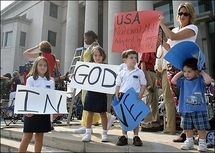
That could be because "a population's religiosity level is strongly related to its average standard of living," Gallup analysts Steve Crabtree and Brett Pehlam said in a report summarizing the findings of the poll.
"Eight of the 11 countries in which almost all residents (at least 98 percent) say religion is important in their daily lives are poorer nations in sub-Saharan Africa and Asia," the report said.
The poverty rate in Alabama was 17 percent in 2007, according to the US Census Bureau, while World Bank statistics show around 20 percent of Iranians live in poverty.
In Zimbabwe, a country where the economy has been plummeting for a decade and inflation is running at several billion percent annually, at least 80 percent of the population live below the poverty line.
Also giving weight to the analysts' theory is the fact that the most religious US state, Mississippi, is also the poorest.
Eighty-five percent of Mississippians say religion is a key part of daily life, according to the poll, for which 1,000 adults each were interviewed in 143 countries between 2006 and 2008.
One in five Mississippians live in poverty, US Census data shows.
"On the opposite end of the spectrum, the 10 least religious countries studied include several with the world's highest living standards, including Sweden... and Japan," the report said.
Religion was a key part of daily life for 17 percent of Swedes and 25 percent of Japanese.
Forty-two percent of Swiss say religion matters a great deal to them, the same percentage as in the US state of Vermont, the least religious state in the union.
Both the northeastern state and the European alpine country have poverty rates of around eight percent. The poverty rate in the United States as a whole was 12.5 percent in 2007.
When all 143 countries surveyed are taken into account, the median percentage for religiosity was 82 percent. The median is value in a set, above and below which there are equal numbers of values.
Although several states were above the global median, the United States taken as a whole fell well below it.
Even though God is invoked when the US president is sworn in, mentioned on dollar bills and in the pledge of allegiance that American students say daily to the flag, just 65 percent of Americans said religion matters in their everyday lives, according to the survey.
That puts the United States about five percentage points behind countries like Armenia, Jamaica, Kosovo, Mexico and Greece on Gallup's religiosity scale.
But "Americans look extremely devout" compared to 27 other wealthy nations, where the median of people who said religion is important in their daily lives was 38 percent, the Gallup analysts said.
------------------------------------------
Image of a woman seen here with her four children in front of the State Judicial building in 2002 in Montgomery, Alabama, by Gary Tramontina.
"Eight of the 11 countries in which almost all residents (at least 98 percent) say religion is important in their daily lives are poorer nations in sub-Saharan Africa and Asia," the report said.
The poverty rate in Alabama was 17 percent in 2007, according to the US Census Bureau, while World Bank statistics show around 20 percent of Iranians live in poverty.
In Zimbabwe, a country where the economy has been plummeting for a decade and inflation is running at several billion percent annually, at least 80 percent of the population live below the poverty line.
Also giving weight to the analysts' theory is the fact that the most religious US state, Mississippi, is also the poorest.
Eighty-five percent of Mississippians say religion is a key part of daily life, according to the poll, for which 1,000 adults each were interviewed in 143 countries between 2006 and 2008.
One in five Mississippians live in poverty, US Census data shows.
"On the opposite end of the spectrum, the 10 least religious countries studied include several with the world's highest living standards, including Sweden... and Japan," the report said.
Religion was a key part of daily life for 17 percent of Swedes and 25 percent of Japanese.
Forty-two percent of Swiss say religion matters a great deal to them, the same percentage as in the US state of Vermont, the least religious state in the union.
Both the northeastern state and the European alpine country have poverty rates of around eight percent. The poverty rate in the United States as a whole was 12.5 percent in 2007.
When all 143 countries surveyed are taken into account, the median percentage for religiosity was 82 percent. The median is value in a set, above and below which there are equal numbers of values.
Although several states were above the global median, the United States taken as a whole fell well below it.
Even though God is invoked when the US president is sworn in, mentioned on dollar bills and in the pledge of allegiance that American students say daily to the flag, just 65 percent of Americans said religion matters in their everyday lives, according to the survey.
That puts the United States about five percentage points behind countries like Armenia, Jamaica, Kosovo, Mexico and Greece on Gallup's religiosity scale.
But "Americans look extremely devout" compared to 27 other wealthy nations, where the median of people who said religion is important in their daily lives was 38 percent, the Gallup analysts said.
------------------------------------------
Image of a woman seen here with her four children in front of the State Judicial building in 2002 in Montgomery, Alabama, by Gary Tramontina.









 Home
Home Politics
Politics









